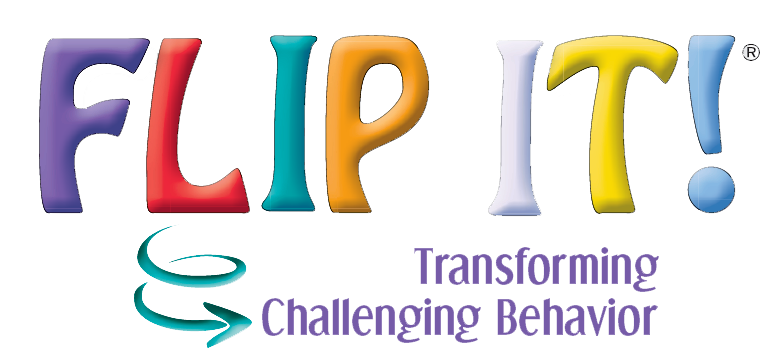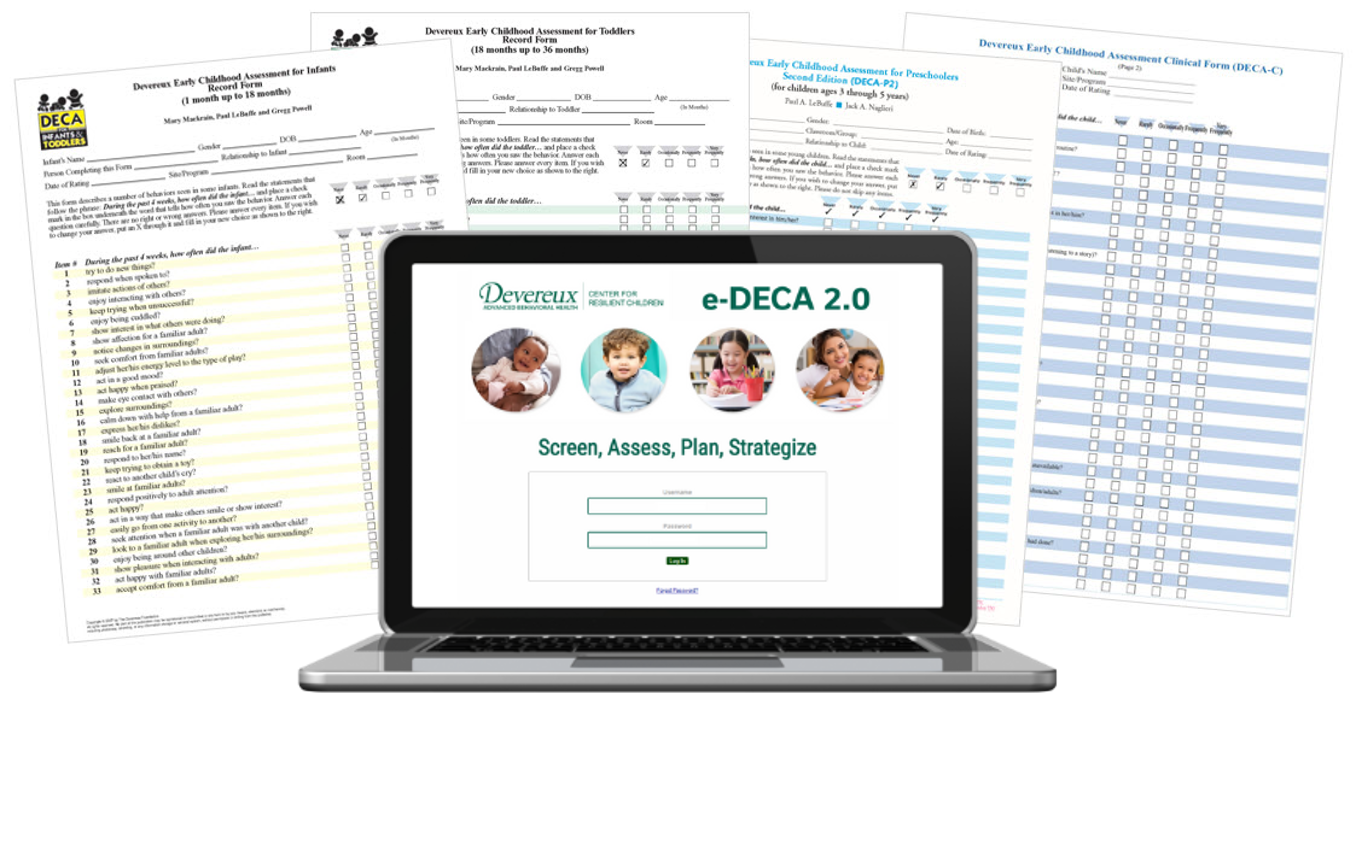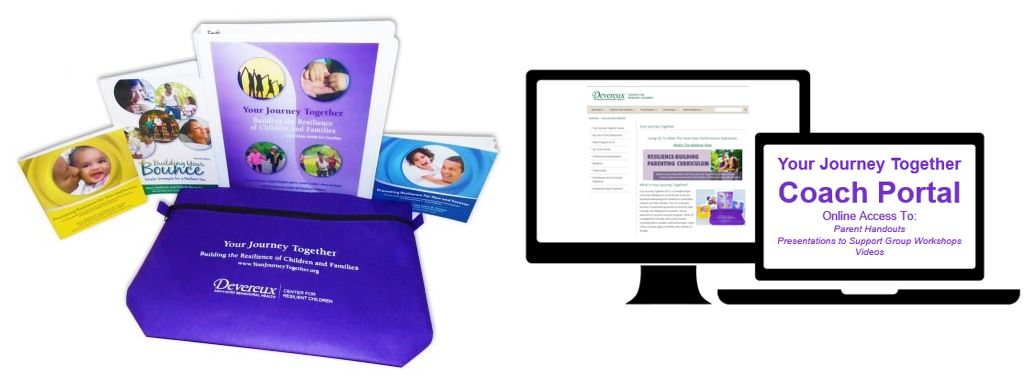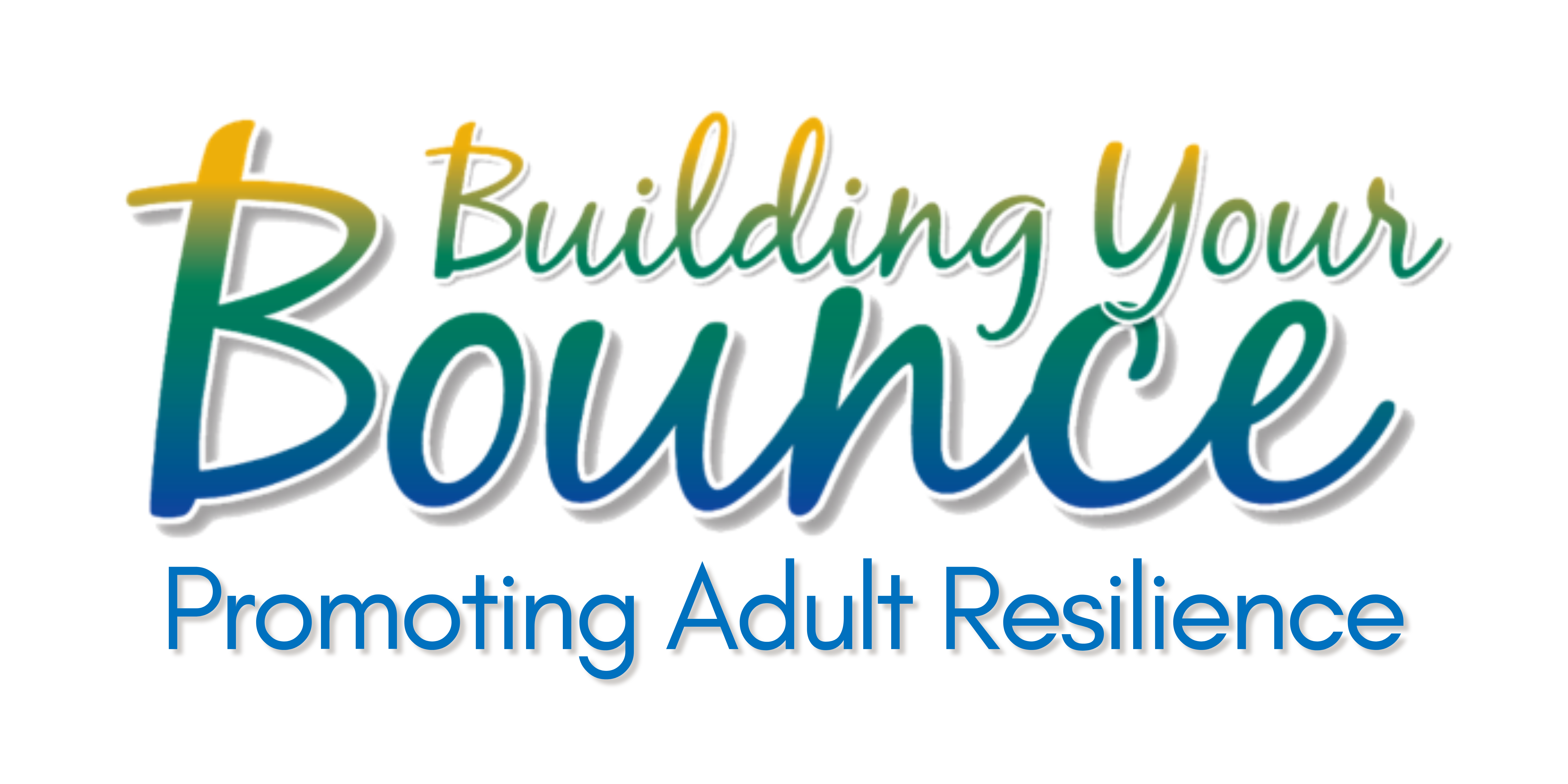Tools & Resources
for Head Start and Early Head Start Professionals
The Devereux Center for Resilient Children (DCRC) strives to promote social and emotional development, foster resilience, and build skills for school and life success in all children from birth through preschool, as well as to promote the resilience of the adults who care for them.
Since the first publication of the Devereux Early Childhood Assessment (DECA) in 1999, Head Start and Early Head Start programs across the country have used the DECA Program resources to meet several key Head Start Performance Standards and, ultimately, to improve the quality of services. The DECA has also been aligned with the Head Start Early Learning Outcomes Framework, ages birth through five.
Our partnership continues on many fronts, including through alignment tools and through free webinars designed to support teachers and staff in Head Start and Early Head Start programs.
Meet Head Start Performance Standards with the DECA Program
Below are just a few examples. Click here to see all standards we can help you meet!
1302.17 Suspension and expulsion
(b) Prohibition on expulsion.
(1) A program cannot expel or un-enroll a child from Head Start because of a child’s behavior.
(2) When a child exhibits persistent and serious challenging behaviors, a program must explore all possible steps and document all steps taken to address such problems and facilitate the child’s safe participation in the program. Such steps must include, at a minimum, engaging a mental health consultant, considering the appropriateness of providing appropriate services and supports under section 504 of the Rehabilitation Act to ensure that the child who satisfies the definition of disability in 29 U.S.C. 705(9)(b) of the Rehabilitation Act is not excluded from the program on the basis of disability, and consulting with the parents and the child’s teacher.
Using DECA Program resources…
For children who are engaging in challenging behaviors, an entire chapter of the teacher strategy guide, Promoting Resilience in Preschoolers (the DECA Preschool Strategies Guide), helps guide teachers to better understand why a child may be using a negative behavior as well as a process for developing a positive guidance plan.
All the strategies and supports offered by the Devereux Center for Resilient Children (DCRC) to address children’s challenging behaviors are research-informed and evidence-based.
In addition to the DECA Program resources, DCRC also offers an additional resource that is specifically designed to provide educators and parents with practical resources to address the needs of children who are engaging in extremely challenging behaviors:
FLIP IT! ® Transforming Challenging Behavior. FLIP IT is a strategy that offers a simple, kind, strength-based, commonsense, and effective four-step process to address children’s day-to-day challenging behavior. The four steps are embodied in the FLIP mnemonic, which stands for F – Feelings, L – Limits, I – Inquiries, and P – Prompts. FLIP IT is evidence-based and transforms best practice into a strategy that is easy to remember, applicable in a variety of challenging situations, and portable.
1302.33 Child screenings and assessments
(a) Screening.
(1) In collaboration with each child’s parent and with parental consent, a program must complete or obtain a current developmental screening to identify concerns regarding a child’s developmental, behavioral, motor, language, social, cognitive, and emotional skills within 45 calendar days of when the child first attends the program or, for the home-based program option, receives a home visit. A program that operates for 90 days or less must complete or obtain a current developmental screening within 30 calendar days of when the child first attends the program.
(2) A program must use one or more research-based developmental standardized screening tools to complete the screening. A program must use as part of the screening additional information from family members, teachers, and relevant staff familiar with the child’s typical behavior.
Using DECA Program resources…
Screening for social, emotional strengths and concerns; Screening for behavioral concerns:
The DECA is a strength-based, standardized, valid, and reliable tool that Head Start programs can use with confidence to screen and better understand a child’s strengths and needs related to social, emotional, and behavioral issues.
The DECA Preschool form (DECA-P2) is appropriate for children ages 3 through 5 years. This tool measures three protective factors, including attachment/relationships, initiative, and self-regulation. The DECA-P2 also includes an 11-item behavioral concerns screener.
The DECA Infant/Toddler (DECA-I and DECA-T) is appropriate for children ages 4 weeks to 3 years. The infant version of the tool measures two key child protective factors, attachment/relationships, and initiative. The toddler version measures attachment/relationships, initiative, and self-regulation.
In best practice, both staff and parents complete the DECA, providing a valuable communication tool to optimize a child’s social and emotional development. The tools have been normed on a representative sample of children in the United States, including children in Head Start. The instruments are available in English and Spanish and in paper and electronic platforms.
1302.51 Parent activities to promote child learning and development
(b) A program must, at minimum, offer opportunities for parents to participate in a research-based parenting curriculum that builds on parents’ knowledge and offers parents the opportunity to practice parenting skills to promote children’s learning and development.
Using DECA Program resources…
Your Journey Together, DCRC’s resilience-building parenting curriculum and DECA Program resource, is designed to promote the resilience of young children and their adult caregivers/parents. This research-based curriculum offers flexible lessons for coaches to implement with parents in individual or group workshop experiences and includes significant opportunities for parents to practice new parenting skills to promote their own protective factors and resilience, and the protective factors and resilience of their young children.
**Your Journey Together (YJT) is listed as a parenting curricula option for families in Head Start and Early Head Start programs on the Parenting Curriculum Review Databases (PCRD)! Learn more.**
1302.93 Staff health and wellness
(b) A program must make mental health and wellness information available to staff regarding health issues that may affect their job performance, and must provide regularly scheduled opportunities to learn about mental health, wellness, and health education.
Using DECA Program resources…
The DECA Program reflects an understanding that the social and emotional health and resilience of staff is connected to the health and well-being of children. As such, adult resilience is a core element of the DECA Program and is built into the DECA Program implementation process as well as the training options offered. Building Your Bounce: Simple Strategies for a Resilient You is a published guide that serves as a resource for teachers to reflect on their own protective factors and to put plans into place that strengthen their personal well-being. The Devereux Adult Resilience Survey (DARS) serves as the core of the guide and is a reliable and valid tool that measures four adult protective factors including relationships, internal beliefs, initiative, and self-control. DCRC offers both virtual and in-person professional development events to help programs embed and prioritize adult wellness into their overall program design.
The Head Start Early Learning Outcomes Framework and the DECA Program
The Head Start Early Learning Outcomes Framework (HSELOF): Ages Birth to Five is designed to represent the continuum of learning for infants, toddlers, and preschoolers. The framework is grounded in a comprehensive body of research about what young children should know and be able to do to succeed in school. The framework is intended to assist programs in their efforts to deliver high-quality early care and learning experiences and to guide programs in aligning their assessments, curricula, and professional development to school readiness goals. The organization of the framework starts with five broad domains (areas of learning and development) that are essential for school readiness and success, including: Approaches to Learning; Social and Emotional Development; Language and Literacy; Cognition; and Perceptual, Motor and Physical Development. Under each domain, components of development within a domain are organized by sub-domain; under sub-domains, broad statements of expectations for children’s learning and development are articulated as goals.
The DECA Program and two of the HSELOF Domains, Social and Emotional Development and Approaches to Learning, strongly align. Access our alignment tool below, which is intended to illustrate the alignment by presenting each domain, sub-domains and goals, followed by a statement that articulates the connection between that information and the three areas of Attachment/Relationships, Self-Regulation, and Initiative.
Resilience-Building Resources to help meet Head Start Performance Standards

To help your program meet Head Start Performance Standard 1302.17 and more, check out the FLIP IT strategy for transforming challenging behavior! This strategy offers a simple, kind, strength-based, commonsense, and effective four-step process to address children’s day-to-day challenging behavior. Click here to see what resources we have available, including the book, a self-paced online course, some free resources, and more!

To help your program meet Head Start Performance Standard 1302.33 and more, the Devereux Early Childhood Assessments are strength-based, standardized, valid, and reliable instruments that Head Start and Early Head Start programs can use with confidence to screen and assess children’s strengths and needs related to social, emotional, and behavioral issues. And you can use the DECA using our web-based system, called the e-DECA. Click here to learn more about the assessments.

To help your program meet Head Start Performance Standard 1302.51 and more, have a look at our resilience-building parenting curriculum, Your Journey Together (YJT). This trauma-sensitive and research-based curriculum is great for coaches to utilize with parents and families, to help them practice strategies for building the resilience of their children. Click here to learn more.

To help your program meet Head Start Performance Standard 1302.93 and more, check out our Building Your Bounce resources! The critical connection between children’s resilience and the health and wellness of the adults in those children’s lives cannot be underestimated. Grab a copy of the book, Building Your Bounce: Simple Strategies for a Resilient You, or just work through our reflection surveys, the Devereux Adult Resilience Survey (DARS) and the Devereux Resilient Leadership Survey (DERLS). Click here to learn more.
Professional Development
All of our professional development options can help Head Start and Early Head Start programs in their practices, and can help in meeting the Head Start Performance Standards. Check out the multiple topic options we have to offer!
Webinars On Demand
Check out these webinar recordings, which touch on how our resources can support Head Start and Early Head Start professionals.
Head Start & the DECA Program: Successfully Meet Your Performance Standards, Part 1
Head Start Programs across the country use the DECA, a strength-based, nationally standardized, reliable and valid behavior rating scale to meet the Head Start Performance Standard for screening behavioral concerns within 45 days. DECA has so much more to offer and can support Head Start Programs in meeting many additional standards, including several new standards. This two-part webinar series will highlight how strength-based, resilience-focused, and research-informed tools created by the Devereux Center for Resilient Children help programs to meet the following standards: Session #1 – Screening and Assessment (1302.33), Teaching and the Learning Environment (1302.31), Child Mental Health and Social-Emotional Well-Being (1302.45)
Head Start & the DECA Program: Successfully Meet Your Performance Standards, Part 2
Head Start Programs across the country use the DECA, a strength-based, nationally standardized, reliable and valid behavior rating scale to meet the Head Start Performance Standard for screening behavioral concerns within 45 days. DECA has so much more to offer and can support Head Start Programs in meeting many additional standards, including several new standards. This two-part webinar series will highlight how strength-based, resilience-focused, and research-informed tools created by the Devereux Center for Resilient Children help programs to meet the following standards: Session #2 – Training and Professional Development (1302.92), Suspension and Expulsion (1302.17), Staff Health and Wellness (1302.93)
Aligned: Head Start Performance Standards & Your Journey Together
In this webinar, participants will learn about Devereux’s research-based parenting curriculum, Your Journey Together (YJT), as it relates to the new Head Start Performance Standards. YJT focuses on empowering parents to promote safe, trusting, and healing home environments for their children—all key elements of a trauma sensitive program. The webinar will highlight: -The basic underlying principles of YJT -The research that informed the creation of YJT -The flexible process that supports the use of YJT during home visits as well as parent trainings, and -The step-by-step, scripted lesson plans that support professionals in sharing YJT with families. For those Head Start Programs already using the Devereux Early Childhood Assessment (DECA) Program, this parenting curriculum will strengthen communication and collaboration between staff working with children and parents.
Nurturing Your Staff: Building the Resilience of Head Start Teachers
New federal guidelines require Head Start Programs to regularly schedule opportunities to learn about mental health, wellness, and health education. This important requirement gives attention to an occurrence that is impacting programs across the country – teacher stress and burnout. The Devereux Center for Resilient Children is working every day to better understand this epidemic and provide solutions to better support teachers in Head Start programs and early care and education across the country. Using the Seven Dimensions of Wellness outlined in the NHSA Nurturing Staff Toolkit, during this one-hour webinar we will begin to outline practical strategies for building the resilience of teachers in Head Start programs. While everyone can benefit from this webinar, we have designed the content to specifically address the new Head Start Federal Requirements related to staff wellness. We will use guiding research that specifically speaks to teacher stress in Head Start programs, and we will use the Nurturing Staff Toolkit, available through membership with the National Head Start Association as our guide.



